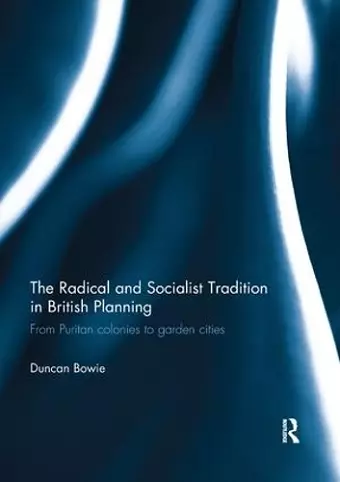The Radical and Socialist Tradition in British Planning
From Puritan colonies to garden cities
Format:Paperback
Publisher:Taylor & Francis Ltd
Published:8th Jun '18
Currently unavailable, and unfortunately no date known when it will be back
This paperback is available in another edition too:
- Hardback£160.00(9781472479020)

Focusing on the key period between the late 18th century and 1914, this book provides the first comprehensive narrative account of radical and socialist texts and organised movements for reform to land planning and housing policies in Britain. Beginning with the early colonial settlements in the puritan and enlightenment eras, it also covers Benthamite utilitarian planning, Owenite and utopian communitarianism, the Chartists, late Chartists and the First International, Christian socialists and positivists, working class and radical land reform campaigns in the late 19th century, Garden City pioneers and the institutionalisation of the planning profession.
The book, in effect, presents a prehistory of land, planning and housing reform in the UK in contrast with most historiography which focuses on the immediate pre-World War I period. Providing an analysis of different intellectual traditions and contrasting middle class-led reform initiatives with those based on working class organisations, the book seeks to relate historical debates to contemporary themes, including utopianism and pragmatism, the role of the state, the balance between local initiatives and centrally driven reforms and the interdependence of land, housing and planning.
At a time when the practice of planning is so contested and the underlying principles largely forgotten in England it plays a vital role in reminding us of the social movement which framed the development of town planning. It seems to me that it provides an insightful and accessible narrative which is crucial in understanding the formative values and philosophy of town planning. It fits very closely with TCPA attempts to ignite enthusiasm amongst practitioners and students for the ambitious social purpose of planning. It should be a core part of planning students reading! It was also simply a great read, providing a vivid picture of the personalities and events that founded the movement.
Hugh Ellis, Head of Policy, TCPA
Banishing cynicism and disillusion, Duncan Bowie's itinerary through the history of utopian settlements reads as a journey not of failure, but hope.
Michael Hebbert, UCL
Bowie successfully presents a contrasting historiography of planning, which rather than focusing on a select group of philanthropists and reformers from the nineteenth century, instead draws attention to working class radicals and socialist reformers, providing both a detailed account of previous periods and alternatives to the classical accounts of the birth of planning, housing and land reform, from Ebenezer Howard, to Octavia Hill and Henry George.
Sophie Elsmore, London South Bank University, International Journal of Housing Policy
Bowie drives home that our roots are in ‘self-supporting philanthropic and co-operative initiatives’, new settlements, using the uplift in land value arising from development for investment in better places, and positively planning our towns for wider community benefits.
Lee Shostak, TCPA, Town & Country Planning, October 2016
Bowie’s style is episodic and at times disjointed but he succeeds in making the argument that town planning developed out of campaigns about the land, its use and ownership – and so suggesting that the profession should not lose sight of the radical impulse from which it arose.
Andrew Whitehead, History Journal Workshop
Yet his work retains a discernible sense of rebellion against the ‘condescension of posterity’ as he indicates how the principles and actions of radical thinkers have been an important component of housing and planning reform, and consequently the physical evolution of urban places.
Jonathan Manns, Journal of the London Society, edition 470
ISBN: 9781138616561
Dimensions: unknown
Weight: 408g
232 pages